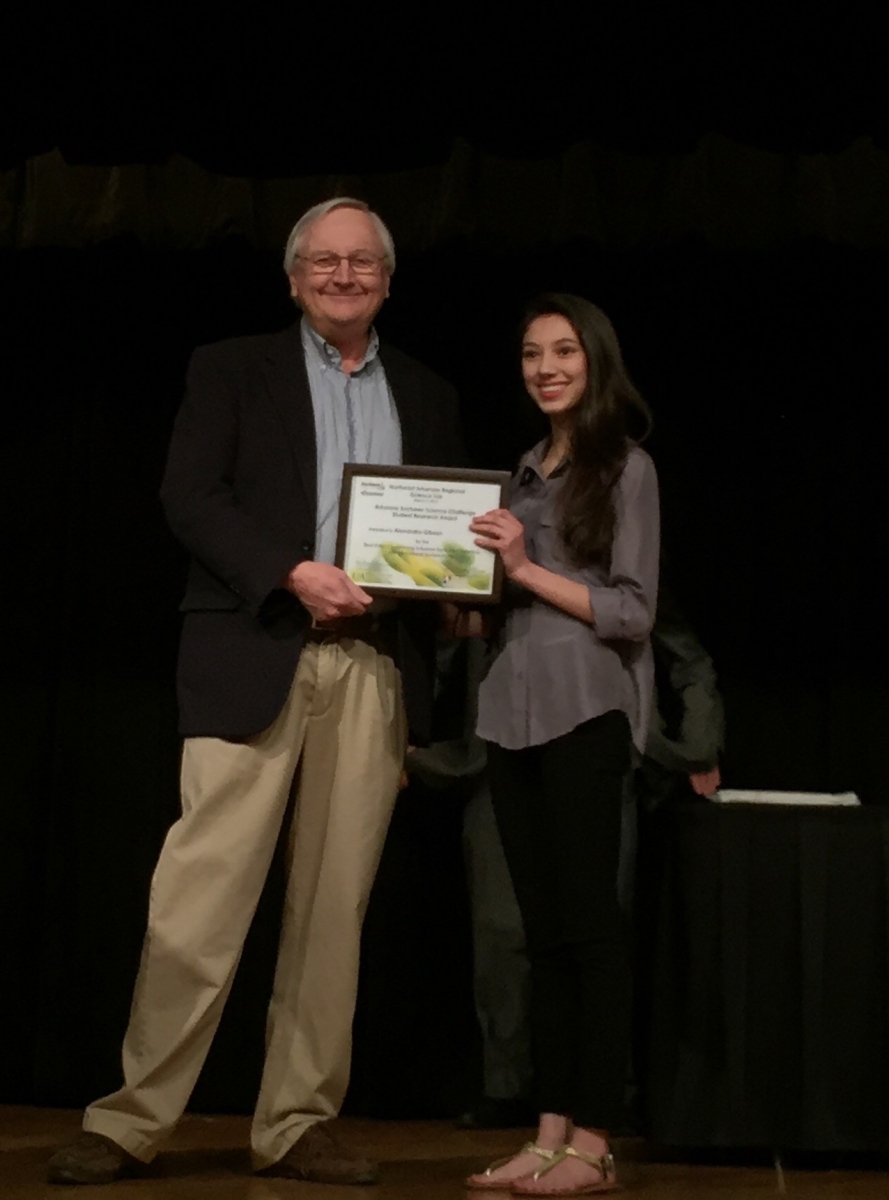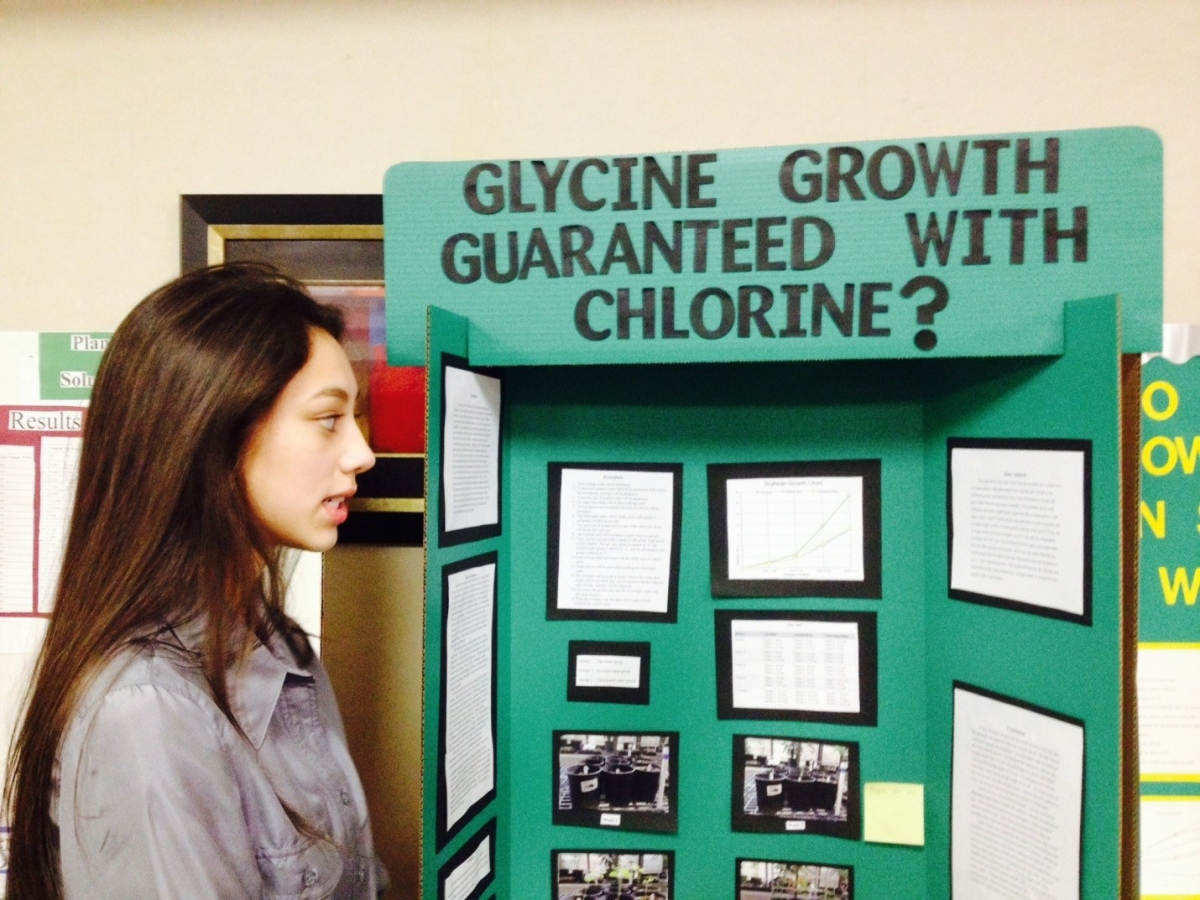Alexandra Gibson

Alexandra Gibson wins Arkansas Soybean Science Challenge Award at
Northeast Arkansas Regional Science Fair
Alexandra Gibson, 15, a freshman at Nettleton Junior High School won the regional round of the Soybean Science Challenge at the 2015 Northeast Arkansas Science Fair held at Arkansas State University on March 16. Alexandra is the second Soybean Science Challenge winner in the Northeast region. Alexandra also was awarded a second place in Plant Sciences.
Alexandra received a $300 cash award provided by the Arkansas Soybean Promotion Board. Her science project involved the study of the effect chlorine has on soybeans.
Completion of an online Soybean Science Challenge course was part of her requirement to meet the eligibility for her project to be judged at the regional science fair. The part of the online course that was most interesting to her was the module on emerging issues for farmers. “My research involved how chlorine in water affects soybeans. Farmers must make high yields each year, and information regarding irrigation can help farmers maintain higher yields,” she said.
Alexandra also found the role of soybeans in making biofuels to be very useful as well. “Most of the fuels we use today are non-renewable resources; however, soybeans are a renewable resource. They can be grown every year and used to make biofuels. Biofuels also make the U.S. less dependent on foreign oils.”
“I’m honored to be the Northeast Arkansas Regional Science Fair winner of the Soybean Science Challenge. I was up against  many other great projects; I’m very humbled that my project was chosen as the winner.”
many other great projects; I’m very humbled that my project was chosen as the winner.”
Alexandra knew only a little about Arkansas soybeans before taking the Soybean Science Challenge online course. She had heard her parents discuss soybeans in Arkansas and Brazil, and remark on the world soybean supply and demand, but other than that had no other knowledge about soybeans.
Alexandra’s parents, Maggie and Perry Gibson were very proud of Alexandra and her accomplishments, which included winning the Soybean Science Challenge.
“When she was little, she wanted a telescope so she could look at the stars. That’s when we first realized she was interested in science and research,” said Maggie Gibson. “And when our family went to the Philippines, Alexandra was very interested in how farming was done there.”
ASPB Board Member Gary Sitzer with Alexandra Gibson, Soybean Science Challenge winner at the Northeast Arkansas Regional Science Fair.
Alexandra’s parents said that she has never made anything less than an “A” and has always been in the gifted and talented classes. Alexandra has always excelled in her science, math, and reading classes. She loves learning and trying new things.
“I learned about the many important uses of soybeans and about issues farmers face when growing soybeans. I hope to research and discover more information on soybeans in the future. I plan to compete again next year in the Soybean Science Challenge,” Alexandra said.
“The Arkansas Soybean Science Challenge Award program is in its second year and is a partnership between the University o f Arkansas, Division of Agriculture Cooperative Extension Service and the Arkansas Soybean Promotion Board,” said Dr. Karen Ballard, Extension developer and director of the program.
“The goal of the Arkansas Soybean Science Challenge is to engage students in “real world” education to support soybean production and agricultural sustainability,” said Shannon Davis, past president of the Arkansas Soybean Promotion Board. “The program also rewards scientific inquiry and discovery that supports the Arkansas soybean industry.”
The Arkansas Soybean Science Challenge was launched in January 2014 to 9-12 grade science students. Students who successfully completed the online course were eligible to have their original soybean-related research projects judged at the 2015 ISEF affiliated Arkansas science and engineering fairs.
Information on the 2015-16 Arkansas Soybean Science Challenge will be available in summer 2015. For more information, contact Dr. Karen Ballard or Dr. Lynda Wilson at 501.671.2086 or kballard@uaex.edu.
The Cooperative Extension Service is part of the University of Arkansas System Division of Agriculture.

Alexandra Gibson with her Soybean Science Challenge winning project at the
Northeast Arkansas Regional Science Fair.
Alexandra Gibson– Second Arkansas Soybean Science Challenge Regional Winner –Northeast Arkansas Regional Science Fair
Project Title: Glycine Growth Guaranteed with Chlorine?
Category: Plant Sciences
Abstract:
This project involves the study of the effect chlorine has on soybeans. The goal of this experiment was to discover if the amount of chlorine in water affects the growth of soybeans. This experiment was conducted by growing 9 different soybean plants with 3 different types of water. Upon examining the growth of the soybean plants, it was discovered that the soybeans grown with the chlorinated water did not grow as tall as the other soybeans. Soybeans are one of the most common and important crops grown in America, and they are a part of most people’s everyday lives. Farmers want soybean crops and the soybean industry to be successful. Information on whether chlorine affects soybeans can be very helpful to farmers. One of the three groups was planted with tap water, and another group was planted with distilled water. The last group was planted with water that had a higher percentage of chlorine than the common tap water. The chlorinated water contained 4 milligrams of chlorine per liter. The results were that the soybeans grown with the chlorinated water did not grow as tall as the soybeans grown with the other types of water. The soybeans grown with the distilled water grew the tallest. The distilled soybeans grew about 14.2 cm taller than the chlorinated soybeans and about 15.2 cm taller than the tap water soybeans. The results showed that water with all impurities removed from it is the best water to grow soybeans with. Chlorine does affect soybean growth.
